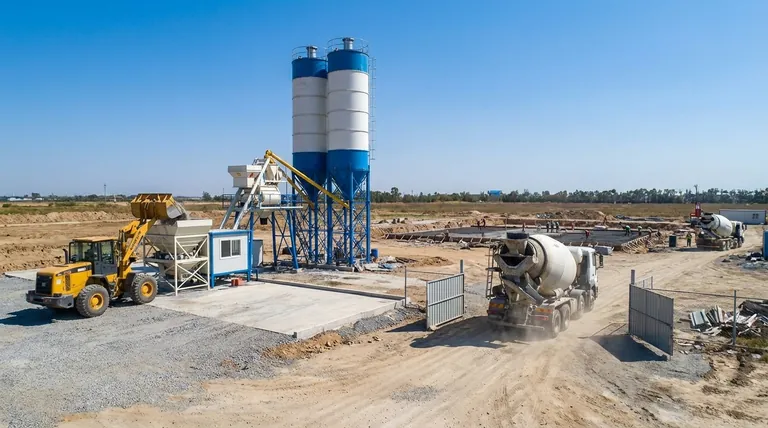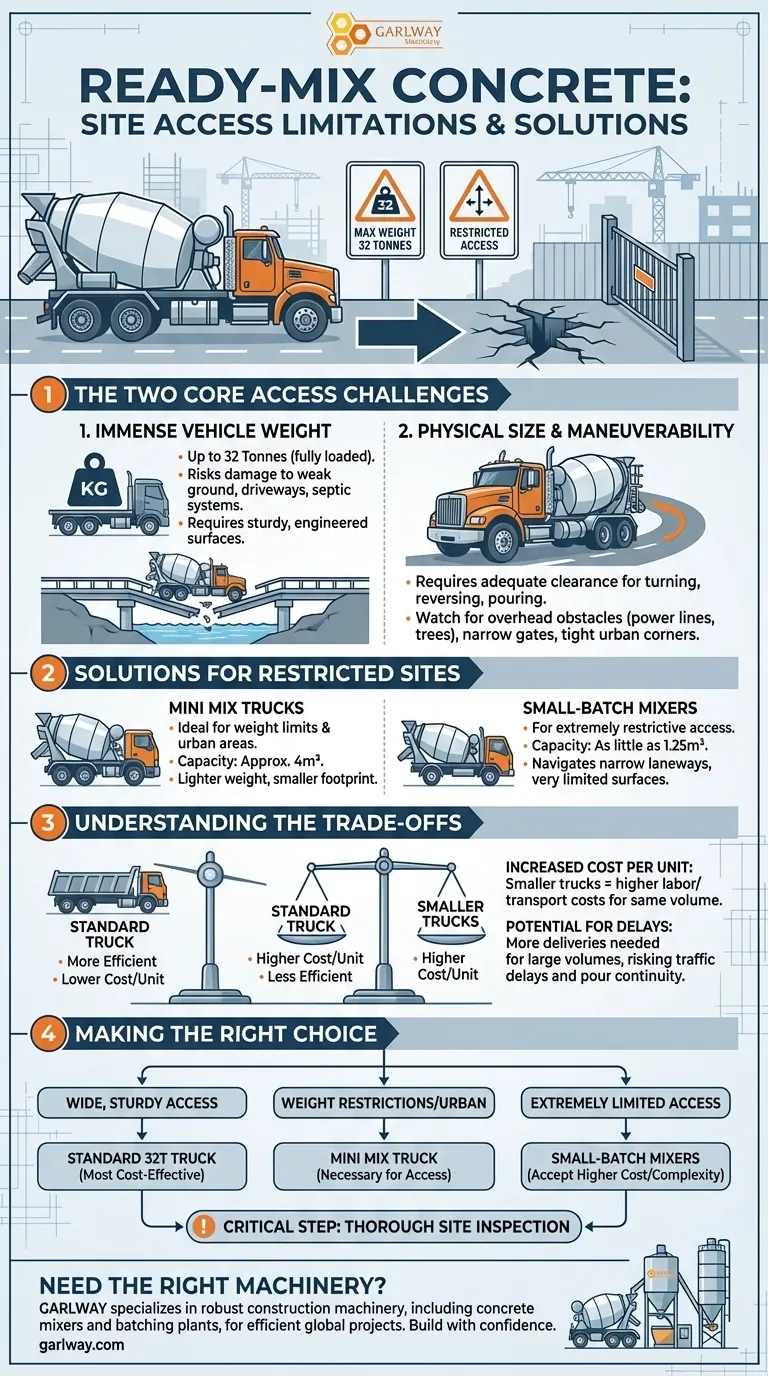The primary site access limitation for ready-mix concrete is the immense weight of the delivery trucks. A standard ready-mix truck can weigh up to 32 tonnes when fully loaded, demanding exceptionally sturdy and stable ground for safe passage and operation.
The core challenge isn't just getting the concrete to your location, but ensuring the delivery vehicle can safely navigate your property without causing damage or getting stuck. Proper site assessment is non-negotiable.

The Two Core Access Challenges
Every site plan must account for two fundamental vehicle constraints: the vehicle's weight and its physical dimensions. Overlooking either can lead to costly delays and damage.
The Impact of Vehicle Weight
A fully loaded ready-mix truck exerts immense ground pressure. This weight, reaching up to 32 tonnes, poses a significant risk to any surface not engineered for heavy commercial traffic.
This includes residential driveways, older bridges, septic systems, and uncompacted or soft ground. The access route must be solid and stable enough to support this load repeatedly if multiple trips are required.
The Problem of Physical Size
Beyond weight, the sheer size of a standard truck requires careful planning. Drivers need adequate clearance for turning, reversing, and positioning the chute for the pour.
Consider overhead obstacles like power lines and tree branches, as well as the width of gates and access roads. A large truck has a wide turning radius, making tight corners in urban or residential areas a major challenge.
Solutions for Restricted Sites
When a standard truck is not feasible, a number of specialized vehicles and methods can be used. These options provide flexibility but come with their own considerations.
Mini Mix Trucks
For sites with weight restrictions or tighter access, 'mini mix' trucks are the most common solution. These smaller vehicles typically carry around 4 cubic meters of concrete.
Their lighter weight and smaller footprint make them ideal for urban projects and residential jobs where a full-sized truck would be impractical or damaging.
Small-Batch Mixers
For even more restrictive sites, very small mixers carrying as little as 1.25 cubic meters are available. These can navigate narrow laneways and weight-limited surfaces that even mini-mixers cannot handle.
Understanding the Trade-offs
Choosing a smaller delivery vehicle is not without its costs. While they solve the access problem, they introduce new logistical and financial considerations.
Increased Cost Per Unit
Smaller trucks are less efficient on a per-volume basis. The cost per cubic meter of concrete delivered by a mini mix truck will be higher than that from a standard truck due to increased labor and transport costs for the same total volume.
Potential for Delays
If your project requires a large volume of concrete, relying on smaller trucks means more individual deliveries. This increases the potential for traffic delays between loads, which can disrupt the continuity of your pour and affect the final quality of the slab.
Making the Right Choice for Your Site
Your decision should be based on a realistic assessment of your site's access capabilities versus your project's volume requirements.
- If your site has wide, sturdy access roads: A standard 32-tonne ready-mix truck is the most cost-effective and efficient delivery method.
- If your site has weight restrictions or is in a dense urban area: A 'mini mix' truck is the necessary choice to prevent damage and ensure delivery is possible.
- If your access is extremely limited: You may need to plan for multiple deliveries from very small-batch mixers, accepting the higher cost and logistical complexity.
Ultimately, a thorough site inspection is the most critical step in planning your concrete delivery.
Summary Table:
| Challenge | Key Constraint | Potential Solution |
|---|---|---|
| Vehicle Weight | Up to 32 tonnes can damage weak surfaces | Use a lighter mini-mix or small-batch truck |
| Physical Size | Large turning radius needs wide, clear access | Plan for overhead clearance and maneuvering space |
| Cost Efficiency | Smaller trucks have a higher cost per unit | Balance access needs with project volume and budget |
Need the Right Machinery for Your Concrete Project?
Planning a concrete pour involves more than just the mix; it requires the right equipment for site preparation and execution. GARLWAY specializes in providing robust construction machinery—including concrete mixers and batching plants—that help contractors and construction companies globally deliver projects efficiently, even on challenging sites.
Let us help you build with confidence. Contact our experts today to discuss your project needs and find the perfect equipment solution.
Visual Guide

Related Products
- HZS75 Concrete Batching Plant Cement Mixer Price Concrete Mixer Bunnings Mixing Plant
- HZS180 Ready Mix Concrete Plant for Foundations with Sand and Cement
- HZS120 Ready Mix Concrete Batching Plant Commercial Mud Cement Mixer
- HZS35 Small Cement Concrete Mixing Batch Plant
- Ready Mixer Machine for Construction Ready Mix Machinery
People Also Ask
- How much weight can a cement mixer hold? A Guide to Choosing the Right Size for Your Project
- How much does a batching plant cost? Uncover the True Investment for Your Project
- How to start a concrete plant business? A Step-by-Step Guide to Launching Your Venture
- Can you mix self leveling concrete in a cement mixer? Avoid Costly Flooring Mistakes
- What are the disadvantages of ready mixed concrete? Navigate Logistical & Cost Risks

















